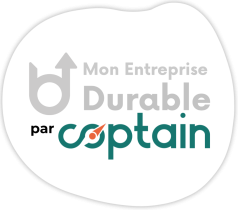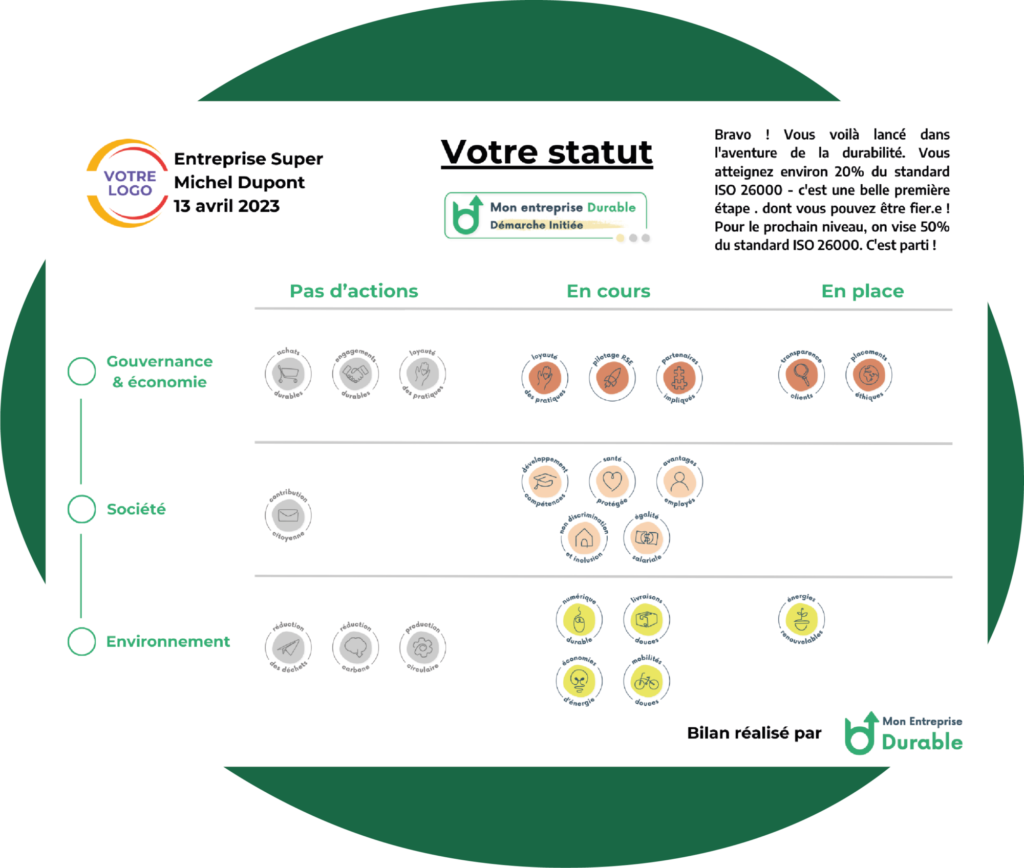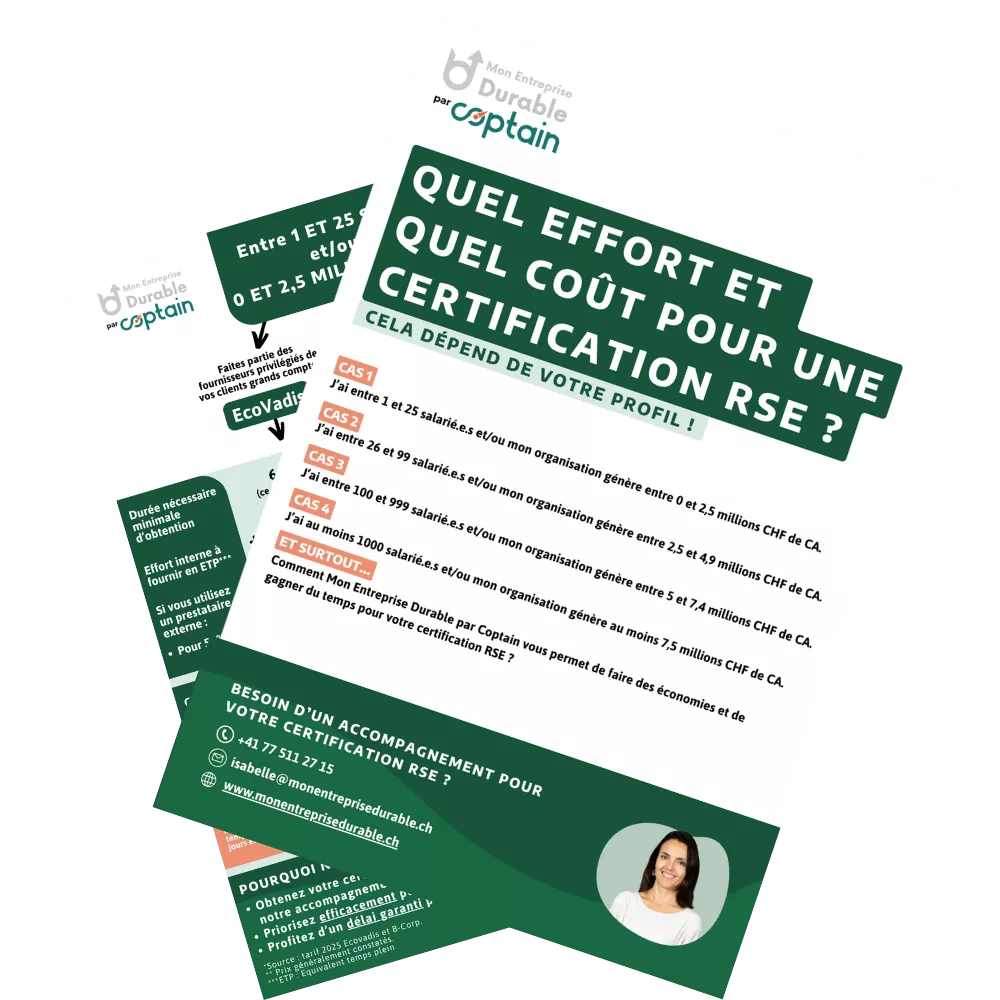Before you start reading
At Mon Entreprise Durable, we support CSR managers in their critical moments: awareness and commitment, audit and action plan, the implementation of 5 actions and certifications.

Key points of the article
Corporate Social Responsibility (CSR) is an essential process for any competitive company. But with all the technical jargon, audits and processes involved, it’s easy to get discouraged about the process of obtaining CSR certification. And yet, it’s entirely possible to bring this project to a successful conclusion without it becoming a source of constant stress. Discover our efficient, stress-free approach.
Why CSR certification? Not just a question of image
The ISO 26000 CSR standard, the EcoEntreprise certificationcertification Ecovadis CSR certification… These standards are more than just an administrative stamp of approval. They are tangible proof that your company is seriously committed to sustainable development, improved working conditions and quality of life at work (QWL).
Enhance your brand image
Obtaining such certification is also an effective way of reinforcing your brand image and meeting your customers’ expectations in terms of social responsibility. But that’s not all. It also strengthens your credibility with investors and business partners. It shows that your company is serious about its commitment, and not just greenwashing. In other words, deploying a CSR approach approach is a real lever for the growth and longevity of your brand.
Improving conditions and quality of life at work
Your commitment to CSR certification is proof that you are taking concrete action to improve the well-being of your employees. How? By reinforcing professional equality, improving workplace safety and developing their skills and employability.
Meeting legal requirements
Following the example of CSRD (Corporate Sustainability Reporting Directive) reporting, more and more laws and regulations require companies to integrate CSR into their operations. With such certification in your pocket, you meet these obligations and anticipate future legislative developments at the same time. It’s a guarantee of compliance that can help you avoid sanctions and stay one step ahead of your competitors.
Making the difference: label, certification or CSR standard?
At this point, it’s time to take a closer look. How do you choose between a label, a certification or a CSR standard?
A label is more general and less rigorous than certification, which requires compliance with precise standards and specific guidelines. For example, the ISO 26000 standard provides guidelines to help companies structure their CSR approach, but does not offer certification as such. EcoEntreprise certification, on the other hand, is based on ISO 26000 and concludes with an external audit validating the company’s processes and the consistency of its CSR approach.
Let’s summarize with the following table:
| CSR Certification | CSR Label | CSR standard |
|---|---|---|
| Certifies conformity to precise specifications | Attests a product’s origin or manufacturing conditions | Provides guidelines without regulatory constraints |
| Issued by a government-recognized organization | Created by a private or public organization | Established by a standards organization |
| Long-term commitment | Less formal, sometimes perceived as a marketing tool | Recommendations and best practices |
Over 30 organizations have already placed their trust in us as they make the transition to sustainability. What if it were your turn? Take action and start your CSR process with us!
Break down the process: one task at a time
The classic mistake is to want to do everything at once, or to do everything yourself. Act differently! Start with an an initial assessment to understand where your company stands in terms of CSR. This can be done through an internal audit or by using online diagnostic tools. The important thing is to have a roadmap and to progress step by step. Take EcoEntreprise certification, for example. Rather than tackling all the categories at once, focus on those that are most relevant to your sector. For example, if you’re in the construction industry, focus on environmental practices and working conditions.
Set up an action plan
Based on your strengths and weaknesses, draw up an action plan with realistic objectives, deadlines and resources. You don’t have to be perfect right from the start. A simple trick is to draw up a list of actions already implemented in your company that correspond to the parameters of the benchmark. You’ll be surprised to find that you may already be meeting many of the criteria without even knowing it. Prioritize the actions that will have the greatest impact with the least effort. For example, if you don’t yet have a waste management policy, this could be quick to put in place and could make a big difference during the assessment.
Following best practices
So as not to reinvent the wheel, draw inspiration from existing recommendations and CSR best practices. Many resources are available, such as those of the United Nations Global Compact or the CSRD reporting guidelines. These tools are designed to help you standardize your CSR strategies while complying with regulatory requirements. Better still, outsource certain tasks to specialist specialized consultants can save you precious time. Finally, consider automating certain repetitive tasks. For example, using reporting software can make it easier to track CSR indicators and prepare for audits.
Mobilize your team
Don’t make CSR certification an individual burden. On the contrary, involve your team from the outset. Each of your employees can contribute in his or her own way to :
- improving working conditions;
- developing partnerships with non-profit organizations;
- initiatives to improve QWL.
Create working groups dedicated to specific themes and define clear objectives. This spreads the workload and encourages collective ownership of CSR performance. Your employees will feel valued when their efforts are recognized by the award of a label or certification.
An effective action plan might look something like this:
| Step | Action to be taken | Responsible |
|---|---|---|
| Initial assessment | Analysis of current practices and identification of gaps | External consultant |
| Implementation of actions | Team training, implementation of eco-responsible practices | CSR Project Manager |
| Internal audit | Process control and necessary revisions | Internal auditor |
| Final audit preparation | Preparation meeting and final adjustments | CSR team |
| Final audit and certification | Presentation to certification body | External consultant |
Which CSR certification to choose?
The ISO 26000 standard is an excellent reference for structuring your CSR approach, but it does not lead to certification. If you’re looking for official CSR certification, you can turn to EcoEntreprise or B Corp for global approaches, or aim for more specific standards such as ISO 14001 (environment), ISO 45001 (occupational health and safety) or ISO 50001 (energy performance). Ecovadis certification, on the other hand, is more flexible and offers a comparative assessment that enables you to situate your company in relation to its peers. This is an interesting option if you work in a sector where comparisons with competitors are systematic.
Make your choice of CSR certification taking into account the size of your company and your priorities in this area. The table below compares some of the most common common CSR certifications.
| CSR Certification | Type of company | Strong points |
|---|---|---|
| Ecovadis | All sizes | Supply chain sustainability |
| B Corp | All sizes | Global commitment and social impact |
| EcoEntreprise | All sizes, including local authorities, associations, etc. | Alignment with ISO 26000 |
| ISO 14001 | All companies with a high environmental impact | Focus on the environmental aspects of CSR |
| Fairtrade | Consumer companies | Ethical trade |
| Positive WorkPlace | SMEs, large companies | Workplace well-being and sustainable development |
| Swisstainable | Companies in the tourism sector | Global, environmental and social commitment |
Case study : Swisscom Group's commitment to sustainability
Swisscom Group has developed an ambitious sustainability strategyinspired by the 17 United Nations Sustainable Development Goals. By 2035, the company aims to be carbon neutral, reducing its direct CO2 emissions by 90% and its indirect emissions by 50% by 2025. At the same time, Swisscom is striving to reduce its customers’ carbon footprint by saving one million tonnes of CO2 per year. On the human front, the company is committed to providing an inspiring working environment, while rigorously applying ethical principles to promote equitable participation in the digital future.
To conclude...
Obtaining CSR certification is not an end in itself, but a long-term commitment. To avoid falling back into the trap of a “shot in the arm” followed by oblivion, discover all the CSR success criteria in a single platform. That way, you can integrate these principles into the very culture of your company. This means continuous improvement, by regularly reviewing your practices and updating your action plan. Remember to periodically review your objectives and celebrate successes, however modest, to keep your teams motivated.
Make CSR certification an asset for your company, without making it a burden for you and your employees. Your commitment will be recognized, your brand will be strengthened, and your company will be better off in every way.
Your goal is to obtain the EcoEntreprise certification ? Put your trust in a company that has gone through the same process. We can also assist you with B-corp, CSRD or Ecovadis.







